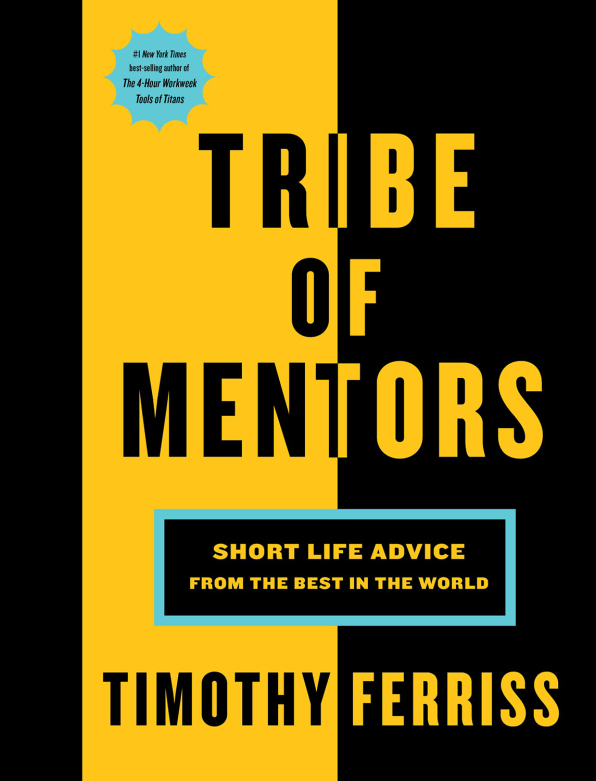Can Tim Ferriss’s Tribe Of Mentors Really Help You?
Tim Ferriss has become the maven of making life simpler. The nine-to-five got you down? Here’s how to trim your toil to four hours a week. Want to become a better cook? Here’s how to prepare anything from sushi to spaghetti with the aplomb of a master chef–and in the process pick up a “meta-learning” technique that can also help you learn a new language or sharpen your athletic skills.
It’s not surprising that our time-starved society lapped up Ferriss’s short, easy-to-digest guides. Since The 4-Hour Workweek hit bookshelves in 2007, it and Ferriss’s subsequent titles have sold millions and inspired a legion of devoted fans who tune in to hear the man himself on his weekly podcast. Ferriss built his brand on hacking everything from sleep to sexual performance in no time, a project that’s been aided and abetted by the rise of Facebook, Twitter, and other social channels that deliver “insights” from experts in 140 characters or a well-timed GIF.
Ferriss is far from alone in his effort to extend a self-helping hand to multitudes who are desperately seeking salves to succeed in every aspect of their lives. For all the potential benefits that lie between its covers, this new book’s most essential service may be in shining a light on the limits of the “four-hour” phenomenon.
On the surface, Tribe of Mentors: Short Life Advice From the Best in the World, looks to be a departure from the franchise. It’s over 600 pages long and densely packed with the musings of over 100 celebrities, athletes, tech founders, and other recognizable thinkers. Where is the shortcut to wisdom?
It’s a question Ferriss tackles head-on immediately. Describing his personal struggle with turning 40 and attempting to define his midlife goals and values, Ferriss says he became overwhelmed by his growing list of queries with no simple answers. In signature style, he muses, “What would this look like if it were easy? is such a lovely and deceptively leveraged question. It’s easy to convince yourself that things need to be hard, that if you’re not redlining, you’re not trying hard enough.”
Of course, it doesn’t have to be hard; you can just get the answers from someone else. If you have Tim Ferriss’s contacts, that someone else can be any number of wise folk from the ranks of cognoscenti he either knows personally or could get introduced to. And he’s aware of that. “What if I assembled a tribe of mentors to help me? More specifically, what if I asked 100-plus brilliant people the very questions I want to answer for myself?” In doing so, Ferriss simply taps further into the zeitgeisty urge to crowdsource quick answers. It’s the same impulse that gave rise to Quora, Reddit, and Facebook’s “seeking recommendations” feature.
So Ferriss drew up 11 basic questions and a list of dream people to which to pose them, then compiled the results into this volume. Although the book doesn’t quite encourage the extreme “body hacking” of The 4-Hour Body, proceeding with caution is always advisable when it comes to shortcutting anything (see the cautionary tale of Ferriss’s own employee who tried to work more hours by using nootropics). Still, Ferriss fails to warn readers that you simply can’t hack wisdom by reading a bunch of answers to some of life’s bigger questions, however well that might work for its smaller ones.
Sure, you can dip in and read just one person’s take on what they’ve gotten better at saying “no” to, or which book tops their most recommended list, or even what failure set them up for future success. But to really get the benefit of collected wisdom, you need to sit down and read the entire book–and spend a considerable amount of time thinking about what the answers mean. Just like you would in real life.
Ferriss is only partially willing to admit that here, writing:
To keep marching forward in the meanwhile, humans (yours truly included) need short-term rewards. In this book, I accomplish that with questions that provide tangible, easy, and often fun answers–Scooby snacks for your hard-working soul. To get the heavier lifting done, these breathers are important.
When should the heavier lifting actually get done, though? It can’t all be breathers, after all. The chief service that Ferriss and others like him perform is to curate information as it’s available and serve it up as digestible chunks so readers can chew it over when they can. No doubt you’ve read a book that lingers on in your mind, long after you’ve turned the last page. The real value is that it makes you think, and hopefully, that thinking turns into a fresh perspective. This is Ferriss’s aim, and it’s hardly unworthy, unreasonable, or unusual.

It only takes you so far, though, and it often falls flat. Writing for Fast Company, veteran executive coach Judith Humphrey argues that “real leaders don’t sound like tear-off calendars,” even though so much of social media already does. Many of us, leaders or otherwise, prefer to get our inspiration from pithy quotes on #MotivationMonday–or any other day of the week for that matter. It’s tempting to think we can read just a couple of pages from an “expert” or “guru” and get exponentially more insight than we would by finding a mentor, or even just working through problems on our own. Ferriss has assembled a book that indulges that temptation–one whose LinkedIn-friendly musings are infinitely shareable and easy to digest.
There is value in that, to be sure, even if it’s of a somewhat lesser order than Ferriss may imagine. There’s also value in this book for those who are willing to work a bit harder for it, even if working hard to reach a goal isn’t characteristically what Ferriss peddles. In his introduction, for instance, Ferriss lays out his method for selecting the questions he wanted to ask his roster of mentors. Some, he admits, he cribbed from other people; others he honed on his own. In doing so, he attempts to teach the astute reader something that they can use in any circumstance: Asking others for help, encouragement, advice, or perspective is one of the best ways to gain knowledge.
Taking that a step further, he writes, “Life punishes the vague wish and rewards the specific ask. No book can give you all of the answers, but this book can train you to ask better questions.” But when every contributor is answering the same 11 questions, it’s not exactly clear how that can train anyone to become a more accomplished interrogator.
This may not be the driver to buy the book, though. The title alone promises to give readers entry into a broad and diverse yet exclusive tribe that wouldn’t admit them otherwise. With the heavy lifting done for them, what need is there to do more than skim the book for inspirational quotes?
For example, will the fact that failure has been inextricably connected to every one of quadruple-amputee mountain climber Kyle Maynard’s success cause them to think more deeply about their own setbacks?
Will those curious readers Googling and clicking on articles offering tips for creative thinking take the time to absorb former NFL star Terry Crews’s hard-won lessons, or will they just default to his tidy summation that “competition is the opposite of creativity?”
The next time a reader is offered an invitation to go somewhere, will they have truly considered graphic designer Debbie Millman’s philosophy that busy is a decision? Perhaps they’ll just tweet: “You don’t find the time to do something; you make the time to do things,” and call it a day.
It’s hard to say. Pith doesn’t equal shallow thinking, but it seems a shame that the things it took this tribe years to learn can be sold as a shortcut. And Ferriss isn’t willing to offer the reader much in the way of how to think through these thorny problems better. Instead, he throws out the life preserver but doesn’t hold onto his end of the rope.
“The hope is that each time you pick up this book, not unlike with the I Ching or Tao Te Ching, something new will grab you, shake your perception of reality, illuminate your follies, confirm your intuitions, or correct your course that all-important one degree,” he states. The rest, dear reader, is all on you.
Fast Company , Read Full Story
(72)














